Building a White Label App: Advantages and Challenges in 2026 [Architecture Example Included]
![Building a White Label App: Advantages and Challenges in 2026 [Architecture Example Included]](/media-webp/luca-bravo-alS7ewQ41M8-unsplash-scaled.jpg.webp)
The popularity of mobile applications is increasing, as is the number of businesses seeking to grow their mobile presence. There are several ways to tap into this trend: as a business that needs a white label app, a software development vendor, or an advertiser. However, in our opinion, the fastest and easiest way to capitalize fully on the popularity of mobile devices is to build and sell white label apps.
But what is a white label app? And how can you build one so it increases your bottom line? In this guide, we will explain the essence and benefits of white label application development in 2026, overview the possible challenges, and provide white label app architecture examples.
from 25 countries outsourced software development to Relevant
We provide companies with senior tech talent and product development expertise to build world-class software.
What are White Label Apps?
So, how to define white label software? White labeling is when a product manufactured by Company A is sold to the end customer under the brand of Company B. For instance, Walmart purchases ready-made products from third-party manufacturers and sells them under Walmart’s brand.
In fact, the concept of white labeling can be applied to any industry, and mobile app development is no exception. Let’s look at an example:
- Let’s say you (Company A) have built a white label Android app for food delivery.
- There’s a restaurant (Company B) that wants to enable their guests to order from their menu with a few taps on their smartphones. So, you sell the app to the restaurant.
- The restaurant styles the solution with its own branding, so it looks to end-users as if the restaurant, not you, has built the application. Meanwhile, you support and maintain the application so the restaurant employees can focus on their jobs fully. But that’s not the end of the story.
- The app has all the features necessary for food delivery. So, you offer it to several other restaurants, and they, in turn, brand the app in their own unique ways
The partnership based on a white label mobile app that we described above enables restaurants to get a fully supported solution fast, with minimal investments. But how did the provider (Company A) benefit from selling the app? Let’s find out.
What’s the Difference Between White Label Mobile Apps & Custom Mobile Apps?
There’s a lot of confusion out there about what a white label mobile app is and how it differs from a custom mobile app. To understand the difference, let’s start with what both have in common – they’re both built for your business and your audience.
Both white label and custom apps are built to make life easier for your customers. They allow them to easily find information about your business, learn more about the products or services you offer, place orders, and solve problems. Now let’s talk about what sets them apart.
The main difference between white label mobile apps and custom mobile apps is that a white label mobile app is designed to be branded and customized, while a custom app is designed only for your company.
White label apps are built in such a way that they can be easily branded and customized, allowing you to change colors, logos, and other elements to make them look unique to your brand. Custom apps are built specifically for your company’s needs, so there’s no way for you to brand them or change their appearance without making major changes to the code itself.
Benefits of White Label App Development (and One Main Challenge)
If you enter “how to become a white label app reseller” into a browser’s search bar, you’ll find numerous offerings, which proves that white label partnership is extremely popular these days. And it isn’t surprising since becoming a white label app provider has a lot of benefits:
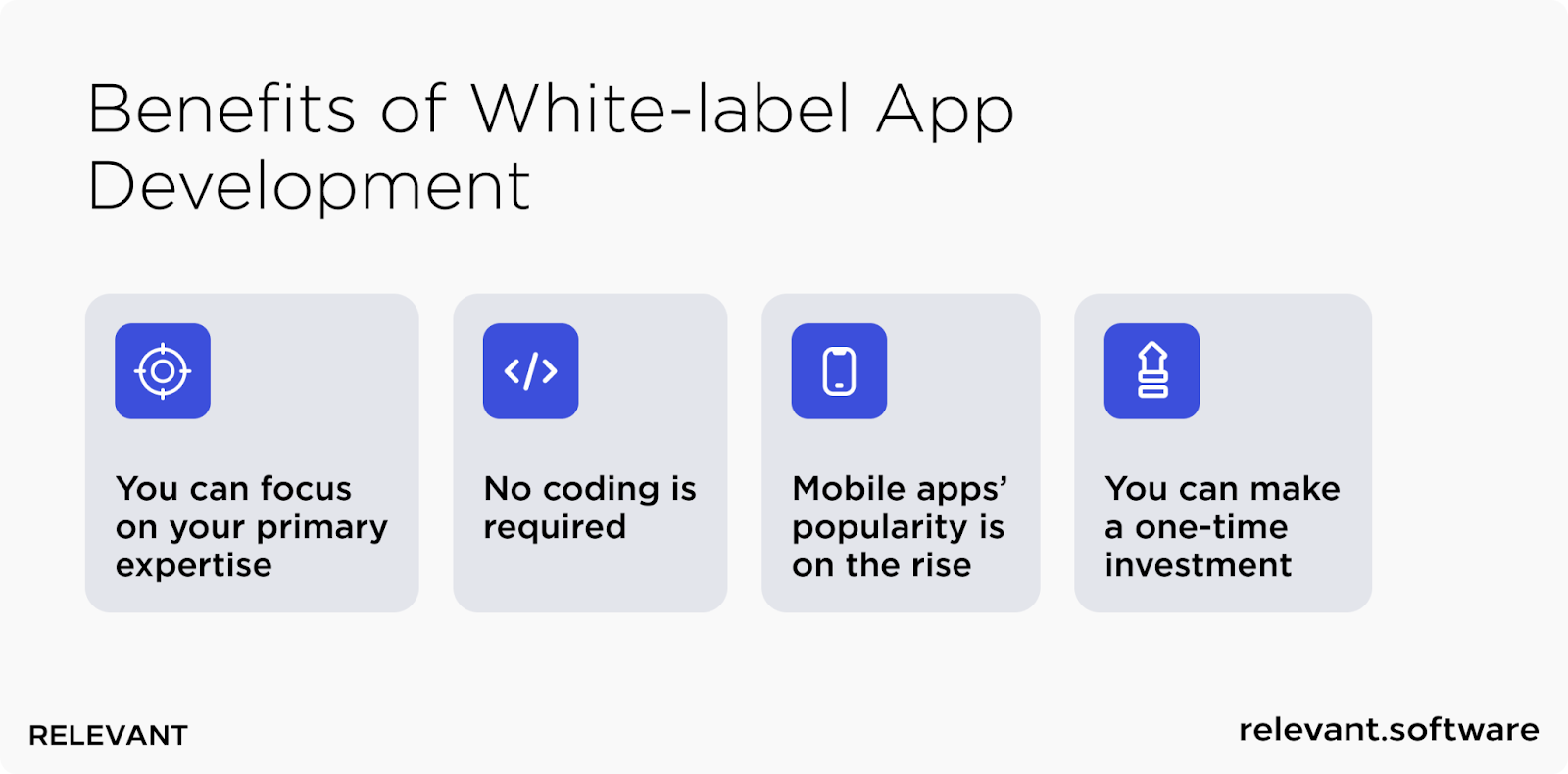
- You can focus on your primary expertise. White labeling is a perfect path for those who can build excellent apps but don’t have the expertise or resources to market them to end users.
- No coding is required. Of course, you can build a white label solution on your own if you have an in-house team of tech experts. But what if you are a born app reseller, not a developer? You can enter this market, too, by outsourcing development to a reliable vendor or by leveraging a white label app platform for non-tech users.
- Mobile apps’ popularity is on the rise. Given that the popularity of mobile apps is increasing rapidly, there are more and more businesses seeking to expand their mobile presence without investing in app development.
- You can make a one-time investment. Building one application that covers the needs of many businesses is much more cost-effective than designing a separate solution for each business. White labeling is all about how one idea can be sold again and again.
Still, it isn’t all roses—there are also a few cons of white label app development. The main trick is that white labeling usually implies that the buyer doesn’t have access to the backend of the application. This means little to no flexibility in terms of customization and scalability, to say nothing about the lack of control over security.
So, it’s no wonder that once the buyer is able to afford custom web development, the risk increases that they switch out of white labeling.
Luckily, you can minimize the risk of losing your partners. When building a white label application, you need to know how to adapt to the current and future business requirements of potential buyers. And a seasoned software development provider, like Relevant, will help you with this.
Which Industries Use White Label Apps?
Buying a white label app can be a go-to option for businesses that need an application with a standard set of features. Typically, these are small or medium companies that belong to the next industries:
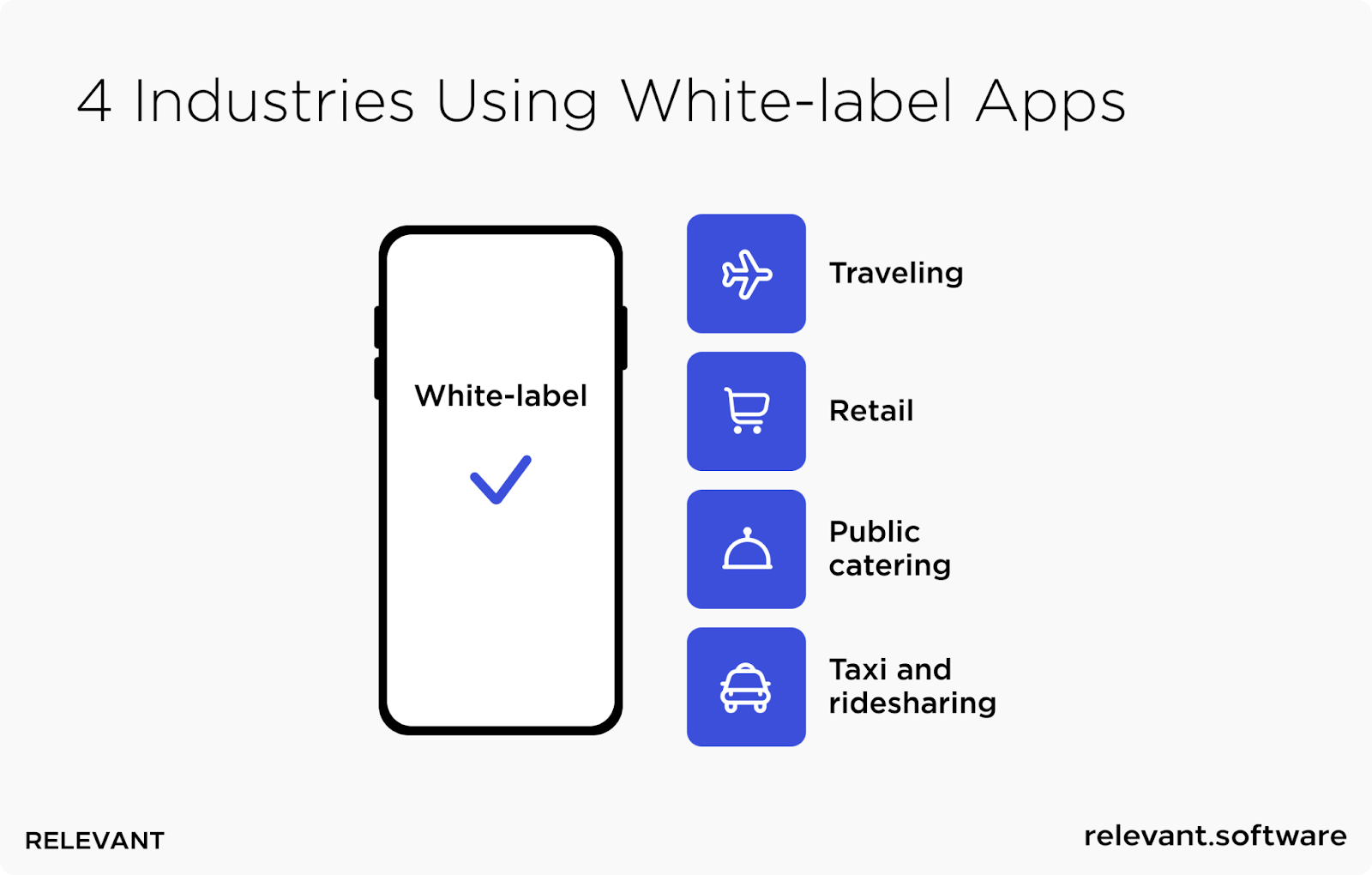
- Traveling. Building a tour or flight booking app from scratch involves a lot of extra work, such as developing itineraries, writing search algorithms, and integrating payment gateways, but all these efforts often result in a solution with typical functionalities.
- Public catering. More often than not, restaurants don’t reinvent the wheel to appeal to mobile users. Menus, restaurant information, ordering, delivery, table reservations, and information about rewards programs are typical features of restaurant apps.
- Retail. Shopify—the world’s leading online store builder—increased its annual revenue by 97% in 2020, which proves the popularity of pre-built solutions in retail.
- Taxi and ridesharing. Like food delivery apps, taxi ordering, and ridesharing solutions also come with a standard set of features, allowing for choosing a car, date, and cost, leaving reviews, and earning bonuses. The only thing remaining is to add some branding to such an app, and it becomes ready for a market launch.
These white label app examples only scratch the surface. Banks, ridesharing providers, fitness studios, beauty salons, florists, dry cleaners, mechanics, and many other businesses tend to buy pre-built solutions such as white label applications or use app builders.
This doesn’t mean, however, that their applications necessarily stand out in terms of performance, security, and usability or actually cater perfectly to their needs. And this is the key to setting your white label apps apart from the competition – just add some novelty and enhance the security to make your app sell better.
White Label App Customization
White label apps are an excellent way to promote your brand and provide users with a familiar experience. However, there are some things you need to know about white label apps before you customize them.
White label apps allow you to customize the look and feel of your app so that it looks like it is part of your company’s brand. You can do it by adding logos and colors, changing icons and buttons, and making sure everything matches up with your other marketing materials. Beyond these aesthetic changes, it’s important to consider the user interface and user experience (UI/UX). This involves tailoring the layout, navigation, and interactive elements to align with your brand values and the preferences of your target audience, ensuring an intuitive and engaging experience.
Additionally, white label applications can be repeatedly customized to match the brand identity of multiple different companies, meaning that with them, an app reseller can create a current stream of income. This flexibility in customization extends to features and functionalities. Depending on your audience and business needs, you can add unique features, integrate with existing systems, or streamline the app by removing unnecessary components.
Moreover, for businesses targeting a global market, localization and cultural adaptation are key. This includes translating the app into different languages and adapting content to meet local cultures and regulations. Also, in industries dealing with sensitive data, like finance or healthcare, ensuring enhanced security features and compliance with legal standards, such as GDPR or HIPAA, is crucial.
Lastly, performance optimization is a significant aspect of customization. It’s essential to ensure that the app is optimized for various devices and operating systems, focusing on responsiveness, load times, and efficient resource usage.
Two Main Approaches to Selling a White Label App
After you’ve decided to build a white label application, the next question is: how can you make it available to your partners? Well, there are two main approaches:
- Multi-tenant approach. Multi-tenant white label applications share a single infrastructure while supporting multiple partners. This means that you provide both the front end and back end of the application to your clients via the cloud on a pay-as-you-go basis. Each client will be able to add their own brand identity elements and choose features from a variety of pre-built functionalities.
- Backend-based approach. As the name suggests, you sell only the back end of the application, giving your clients the freedom to develop their own front end. Since you’re handling only the backend, this type of white label solution is easier to support than its multi-tenant counterparts.
In addition, there is a B2B and B2C white labeling classification. For example, when a restaurant rebrands a food ordering app and then offers it to its guests, it’s B2C white-labeling. At the same time, when a digital marketing provider rebrands a white-label CRM app and resells it to other businesses, it’s B2B white labeling.
White Label App Development: Relevant’s Case Study
Some businesses dedicate all their time and resources to providing white label web applications (or their mobile counterparts) to other companies. Still, this isn’t the only way to take advantage of this business model.
You can also develop an application for your particular needs and then white label it for other companies. But how can you build a solution that is white label and branded at the same time? Let’s take one of our projects as an example.
FirstHomeCoach app and its main features
Not long ago, we helped our UK-based client build FirstHomeCoach (FHC), a mobile solution for property buyers. The app consists of several modules, such as:
- Property buying plan shows how much a user should save every month to buy a property within a specified timeframe.
- Mortgage calculator helps users find the best loan model based on their monthly income, savings, and location.
- Deposit builder allows users to save as much as possible to get the property sooner
- Third-party integrations. The app integrates with banks, credit unions, and insurance companies.
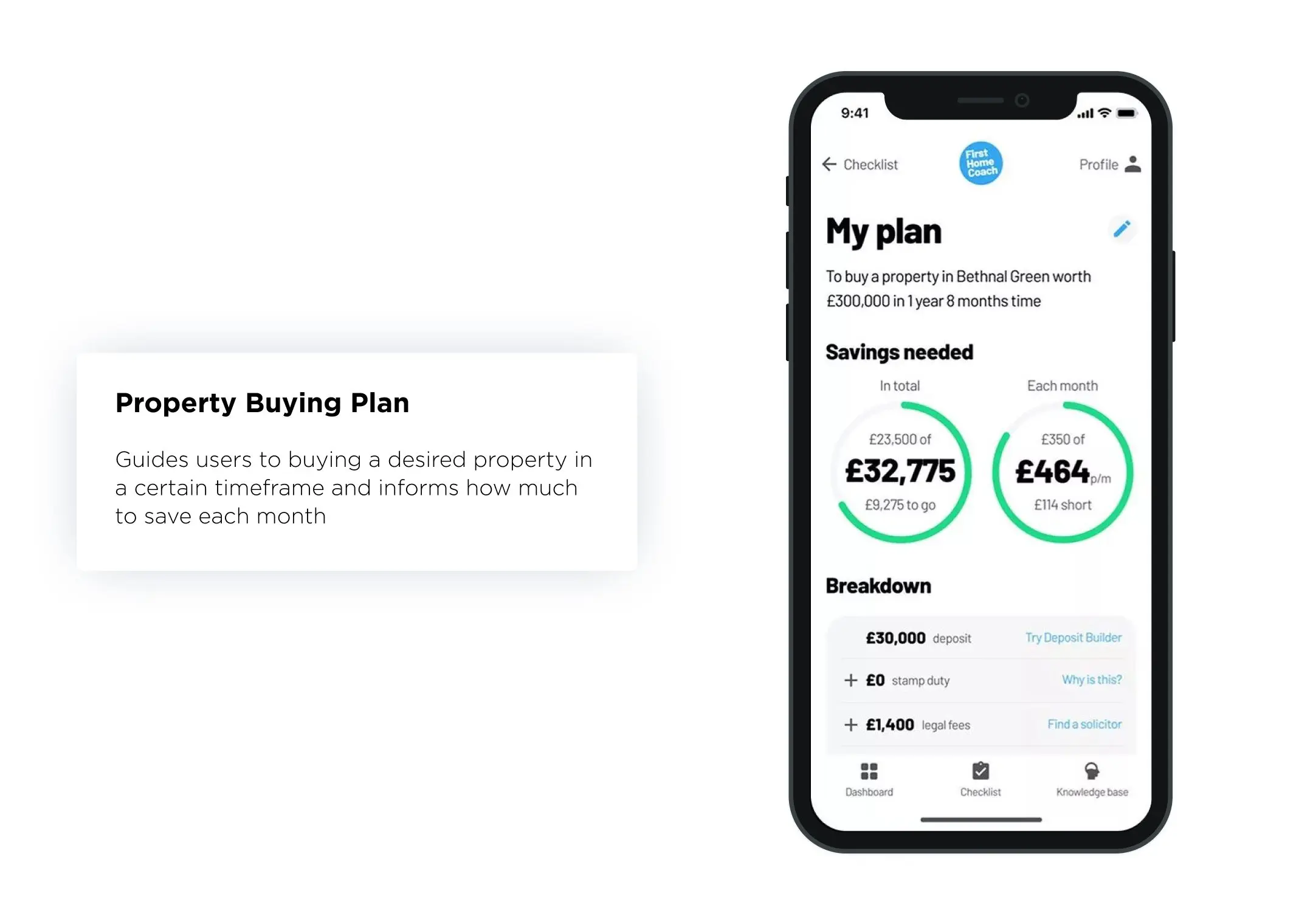
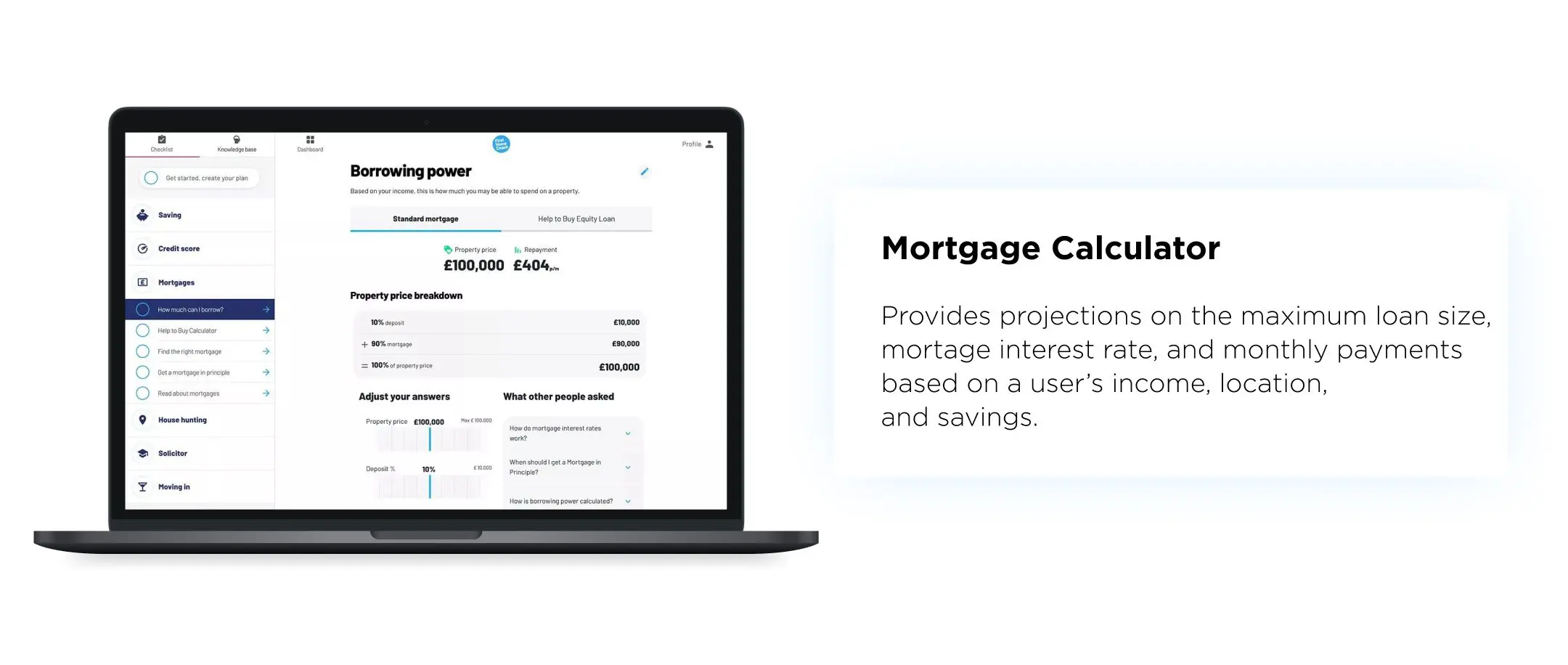
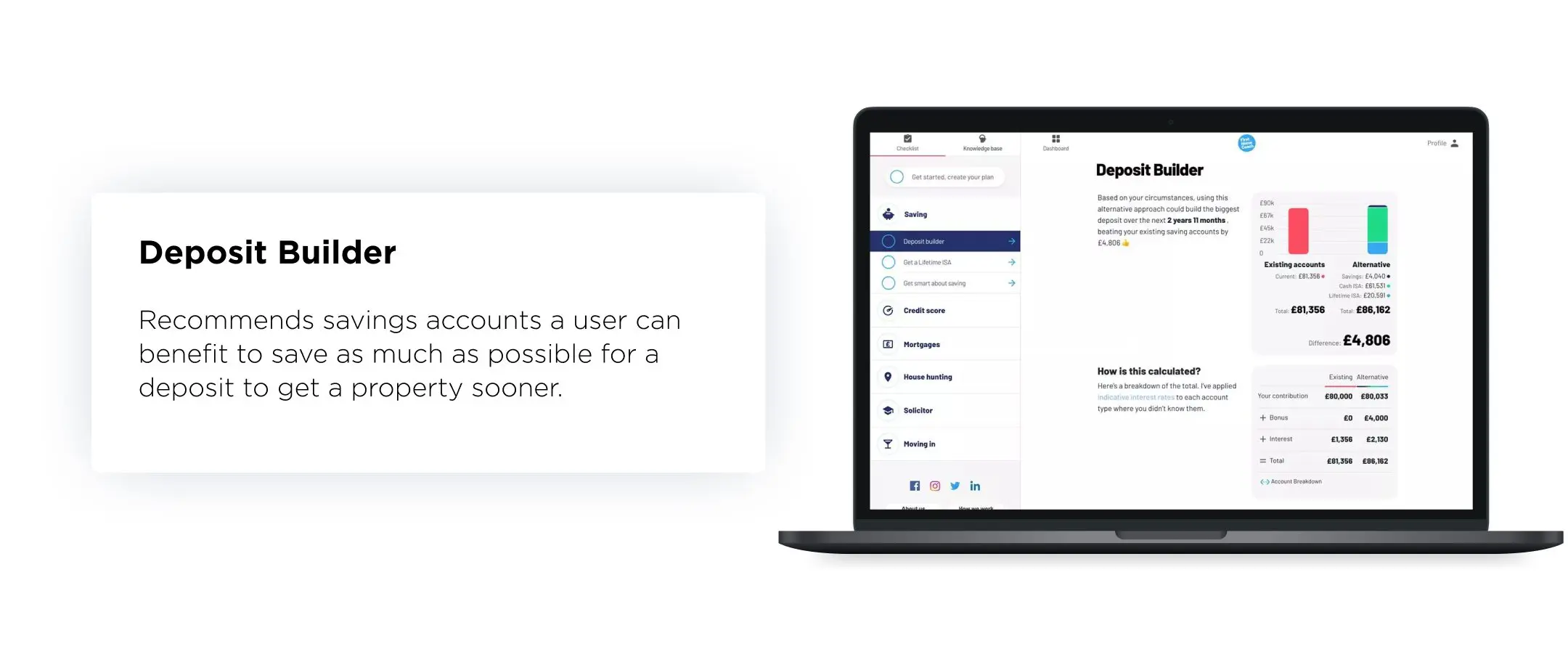
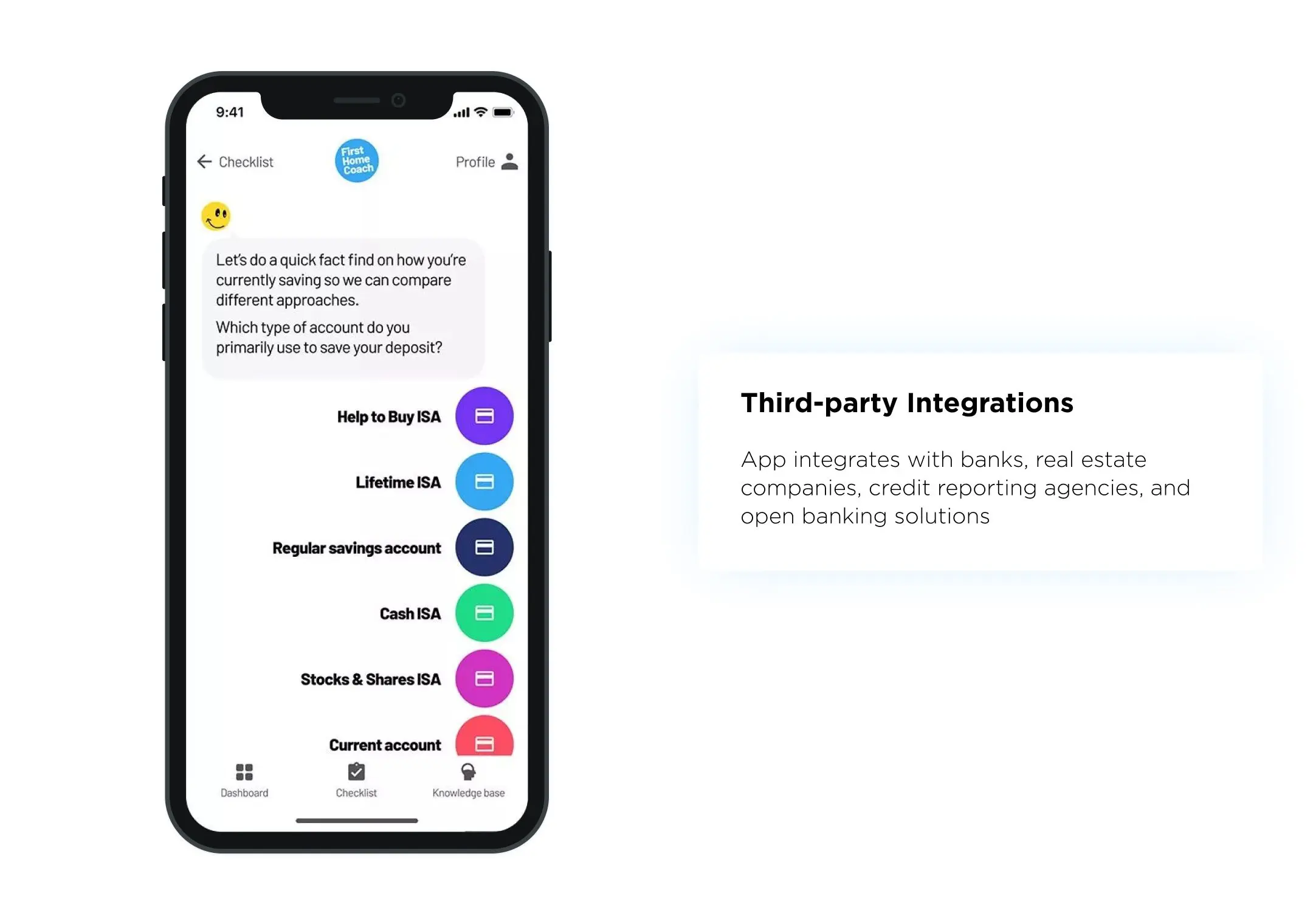
Our experts built the entire solution from the ground up. We took care of everything from selecting a tech stack to implementation while paying particular attention to securing user-sensitive data.
FHC as a white-label mobile platform
Later, the client approached us again with the request to make some of the modules accessible to their partners in a white label format. As a result, we added the next capabilities to FHC:
- The ability to switch between various modules depending on what functionality each partner needs
- The option to change styles based on the brand’s identity
- A unique module for one of the partners.
Though both the client and their partners are already using the platform, we keep working on it. Our current task is to launch Light Hub Application, which will allow partners to manage content on their white label solutions on their own. For the time being, all content management is performed by the client’s team.
Underlying technologies
To ensure the flawless work of the app, regardless of which modules are on and how many people access them, we decided to use React, go for a monolithic frontend, and implement lazy loading. This means that each partner can include or exclude modules based on their affiliate configurations without affecting performance.
At the same time, our backend has the microservices architecture: we divided its code into separate services, including User, Content, Configuration, etc. With microservices, various system components are less dependent on each other in contrast to the monolithic architecture. This makes the process of building and deploying code faster and more secure.
When all services are isolated, you can securely set user permissions and privileges while developing each module independently (which allows for working on multiple modules simultaneously).
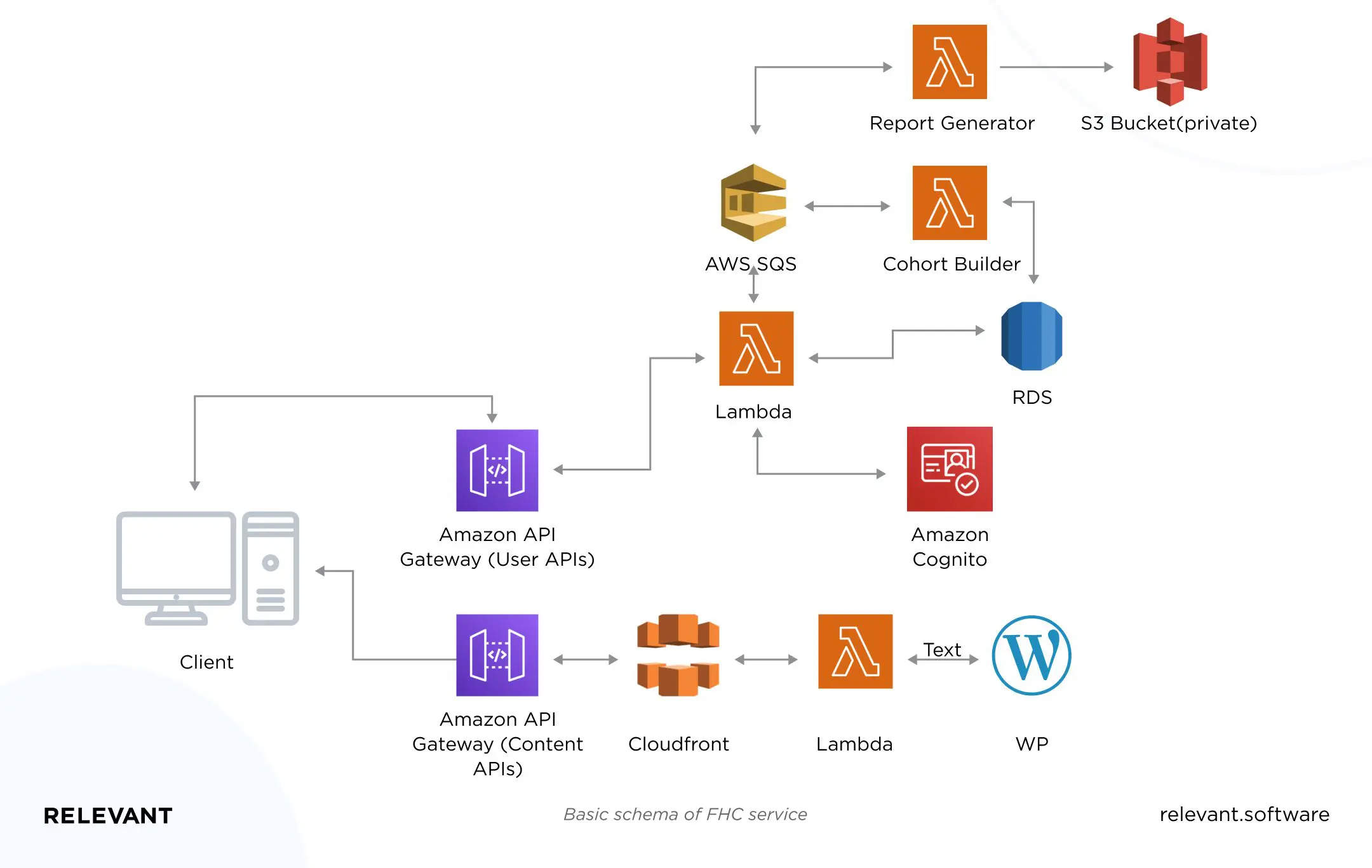
Additionally, since FirstHomeCoach is a multi-component platform with complex workflows, we used a mono repository, which allowed us to:
- Store all code, tests, and configurations in one place
- Collaborate on the same project easily
- Make atomic changes (when the same change can be applied across multiple projects)
- Share and reuse code
- Manage dependencies more efficiently (before you make a change, the technology allows you to see its impact on the entire system)
The FirstHomeCoach project has demonstrated that white labeling is not all about basic, generic applications. The platform serves a double purpose. On the one hand, it keeps on guiding users through the complex process of property buying. On the other hand, we manage to adapt it to the business case of every client’s partner.
[e-book id=”8445″]
How to Choose a White Label App Development Company in 2024
The process of choosing a white label development company is very similar to how you hire a software development team to outsource any other project type. It’s critical to consider the vendor’s experience, expertise, pricing, communication style, testimonials, cultural fit, or whatever your outsourcing strategy requires. Still, there’s one difference: your potential partner should have proven experience building white label solutions in your niche. So, make sure that they:
- Know your audience. Most white label apps target not an individual customer but an entire segment. Do you need a white label fintech platform or hospital mobile app? These two serve completely different groups of customers. So, be sure that your future development partner knows the ins and outs of your end-users and stays current with their preferences (which surely tend to change with time).
- Know your competition. More often than not, white label applications are generic, which makes them unattractive. Be sure that your outsourcing prospect knows the competition in your niche and knows how to make your solution stand out. For example, if you need a white label social network app, it should be different from Facebook or Instagram. Otherwise, your project will have little chance of surviving.
- Know the tech side of things. Since white labeling often implies making one solution accessible to a large number of buyers via the same cloud, white label app architecture is different from the other solution types. Find a development partner that excels at building applications that can be securely shared with multiple users.
- Know how to customize your solution. App stores often reject spam applications. This means that the customization capacity of your apps should go beyond changing colors and logos. Look for a vendor able to adapt applications to the needs of your white label partners.
- Provide Robust Support and Maintenance: The chosen company should offer comprehensive post-development support and maintenance. This includes regular updates, bug fixes, and enhancements to keep the white label application relevant and functional over time. The ability to provide consistent, ongoing support is crucial for the long-term success of a white-label app.
- Demonstrate Scalability and Flexibility: It’s essential that the development company demonstrates the capability to scale and adapt the white label app according to growing user demands or changing market trends. This means having the infrastructure and expertise to efficiently scale the app’s capacity, add new features, or modify its functionality as required.
- Incorporate Advanced Security Measures: Ensure the company has robust security protocols in place. With white label apps often handling sensitive user data, particularly in sectors like fintech or healthcare, it’s crucial that the app is built with advanced security measures to protect against data breaches and cyber threats.
- Effective Marketing and Monetization Strategies: The development company should also have expertise in marketing and monetization strategies specific to white label apps. This includes understanding how to effectively market the app to potential clients and suggesting monetization models that can be beneficial for both the app provider and the client, such as subscription models, in-app purchases, or ad revenue.
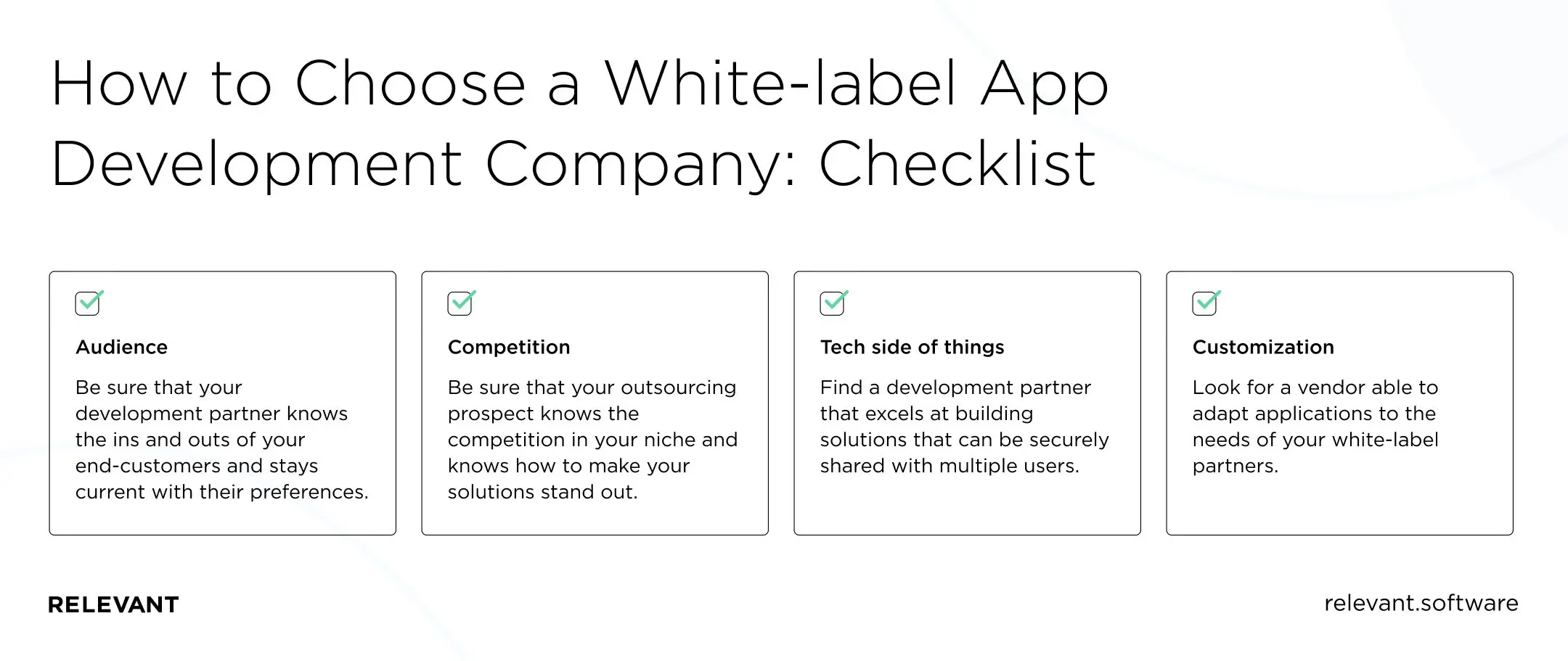
Looking at the examples of white label apps they have designed previously will help you answer these questions. It’s also recommended to ask their previous clients for testimonials and look at how their projects perform now.
White Label App Development: Summary
White labeling appears to be a fail-proof strategy to enter the app market. And it is, but with the wrong product development approach, there’s a big risk of quickly losing your white label partners. The main problem is that most white label solutions have a number of limitations, including the lack of customization and scalability.
Still, you can take white labeling to the next level by building unique, flexible, and secure apps with a reliable white label software development vendor — the success of FirstHomeCoach proves this point.
So, if you are interested in selling solutions that will help your white-label partners grow, we are here to help you with our white label web development services. Just reach out to our white label studio by filling out a short contact form.
FAQ
What are white-label mobile apps?
A white label mobile application is a solution built by Company A and then offered to the end customer under the brand of Company B. For example, you can develop a food delivery app and then sell and rebrand it for a few restaurants. As a result, the restaurants receive a fully supported solution while you have a source of recurring income.Which industries use white label solutions?
Buying a white label solution can be a go-to option for businesses that need an application with a standard set of features. Banks, ride-sharing providers, fitness studios, beauty salons, florists, dry cleaners, mechanics, and many other businesses tend to buy pre-built solutions, like white-label applications or app builders.What are the different types of white label products and services?
In fact, you can white label everything from apps and content to services and hardware products. Besides, you should distinguish between B2B and B2C white labeling. For example, when a restaurant rebrands a food ordering app and then offers it to its guests, it’s B2C white-labeling. At the same time, when a digital marketing provider rebrands a white label CRM app and resells it to other businesses, it’s B2B white labeling.How can I develop a solution to sell in white-label format?
There are three main ways to enter the white-label app development market: by hiring an in-house development team, using a white-label app builder, or partnering with a reliable white-label development vendor. Hiring in-house developers is often too expensive, while apps built with white-label builders tend to be overly generic. Partnering with an experienced white-label development vendor helps avoid these drawbacks, allowing you to create unique, high-quality, and fully customizable products at a reasonable cost.

Hand-selected developers to fit your needs at scale! Let’s build a first-class custom product together.

